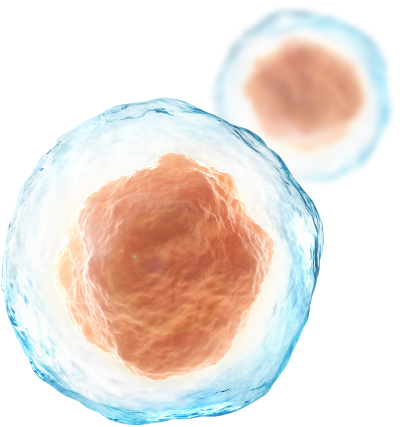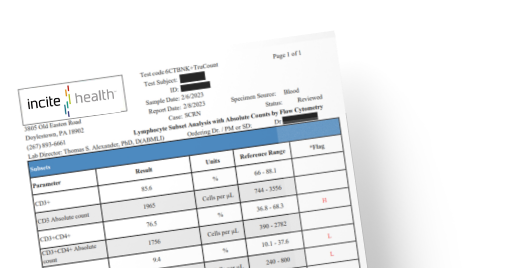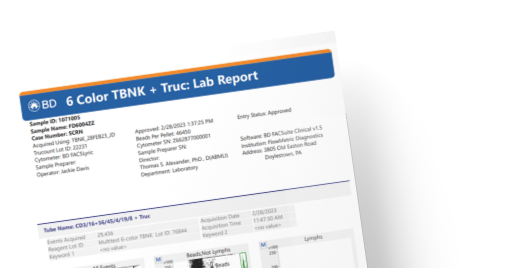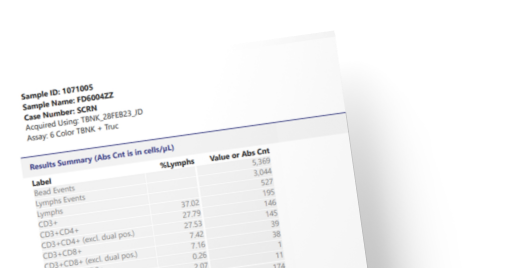TBNK Flow Cytometry Panel
Quantitative Lymphocyte Subset Analysis: T, B and NK Populations
TBNK Overview

Flow cytometry can be used to rapidly identify and quantify cell populations based on their size and internal complexity (granularity), coupled with the expression of various cell surface and intracellular proteins, receptors, and antigens. It has therefore become a powerful tool in the measurement of the absolute number of T, B, and NK-cells in peripheral blood samples, as well as to quantify the relative proportions of each cell type.
This information can be used to assess the health of the patient’s immune system, and to monitor the effectiveness of treatments such as immunotherapy. Additionally, flow cytometry can be used to identify and quantify specific subpopulations of T, B, and NK-cells that are associated with particular diseases and immune responses.
Includes:
CPT Code Information 86355-B cells; total count 86357-Natural killer (NK) cells; total count 86359-T cells; total count 86360-Absolute CD4/CD8 count with ratio.
Sample Requirement:
Container Lavender top (EDTA), 3mL whole blood. For serial monitoring of patients, it is highly recommended that samples are collected at the same time of day for each blood draw.
Product Handling:
Ambient shipping. Receipt within 48 hours of collection.

Clinical TBNK Testing

Within a clinical setting, a flow cytometry TBNK panel can be used to diagnose or monitor a range of conditions. The Public Health Service has recommended that the levels of CD4 lymphocytes be monitored in all HIV-positive patients every 3 to 6 months.
Within clinical trials, TBNK flow cytometry analysis is often used to evaluate the effects of a drug or therapy on the immune system. For example, researchers may use this technique to assess the impact of an immunotherapy drug on T cell function or to evaluate the effects of a vaccine on B cell activation.
There are caveats to this level of monitoring since absolute counts of lymphocyte subsets are known to be influenced by a variety of biological factors, including circadian rhythm, the levels of certain hormones, as well as environmental factors such as seasonal changes in temperature- all of which work to modulate cellular immune responses.
The diurnal variation in circulating lymphocytes appears to be driven by cortisol and epinephrine levels in the blood and is hallmarked by a progressive increase in CD4 T-cell count throughout the day, coupled with an increased number of circulating CD8 T cells and CD19+ B cells in the morning, with no change between noon and afternoon. In contrast, natural killer (NK) cell counts are stable throughout the day. For these reasons, it is recommended that clinical sites apply consistency in sample collection times when monitoring patients for lymphocyte subsets longitudinally.

Lymphatic Subset Analysis with Absolute Counts Lab Report
View Report
6 Color TBNK + Truc: Lab Report
View Report
Results Summary (Abs Cnt is in cells/μL) Lab Report
View Report
Common Applications of TBNK Panels

Immunophenotyping:
TBNK panel testing can be used to identify and quantify the presence of specific cell surface markers on different cell types. This can be used to diagnose and monitor diseases such as leukemia and lymphoma which can involve abnormal T, B and NK cell populations. By identifying these subpopulations, researchers can better understand the mechanisms underlying disease progression and develop more targeted treatments.
Immune System Monitoring:
TBNK testing can also be used to assess the quality and consistency of cell-based therapies. For example, researchers may use this technique to assess the purity of a particular cell population or to evaluate the effectiveness of a cellular immunotherapy.
Immune Deficiency Disorders:
TBNK testing is used to both diagnose and monitor immune deficiency disorders such as severe combined immune deficiency (SCID) and common variable immune deficiency (CVID), irrespective of their underlying associated genetic defects.
Autoimmune Disorders:
TBNK testing is used to support the diagnosis of various autoimmune disorders involving the dysregulation of T and B-cells; these include lupus, rheumatoid arthritis, and multiple sclerosis.
Transplant Monitoring:
TBNK testing is used in the management of immunosuppression and transplant rejection in patients following stem cell and organ transplantation.
Drug-Induced Immunosuppression:
TBNK testing is used to monitor the immune system of patients undergo a range of immunosuppressive therapy – such as those on immune-modulating biologic drugs, or chemotherapy.
Infectious Diseases:
TBNK testing can be helpful in the diagnosis and monitoring of both viral (HIV, Epstein-Barr and cytomegalovirus) and bacterial (tuberculosis) infections that directly affect T, B and NK cells populations.
Cell Sorting:
Flow cytometry TBNK panel testing can be used in the isolation and purification of specific cell populations. This can be used to study the properties of individual cell types or to create cell lines for further research.
Cell Cycle Analysis:
TBNK testing can be used to measure the size and DNA content of cells. This can be used to study cell cycle progression and to detect abnormalities in the cell cycle.
Rare Cell Analysis:
The inclusion of additional biomarkers to the TBNK backbone panel, is often used to identify and quantify rare cell populations, such as stem cells and lymphoblasts, which are of particular interest in the diagnosis and treatment of certain autoimmune and neoplastic diseases.





